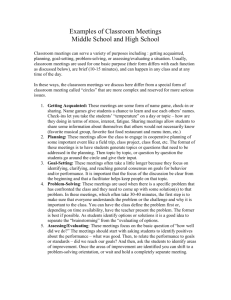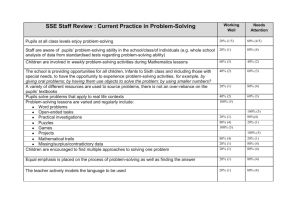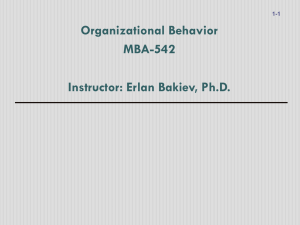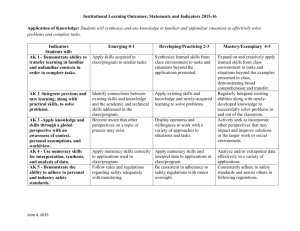Problem-Solving Rubric: Assessment & Evaluation
advertisement
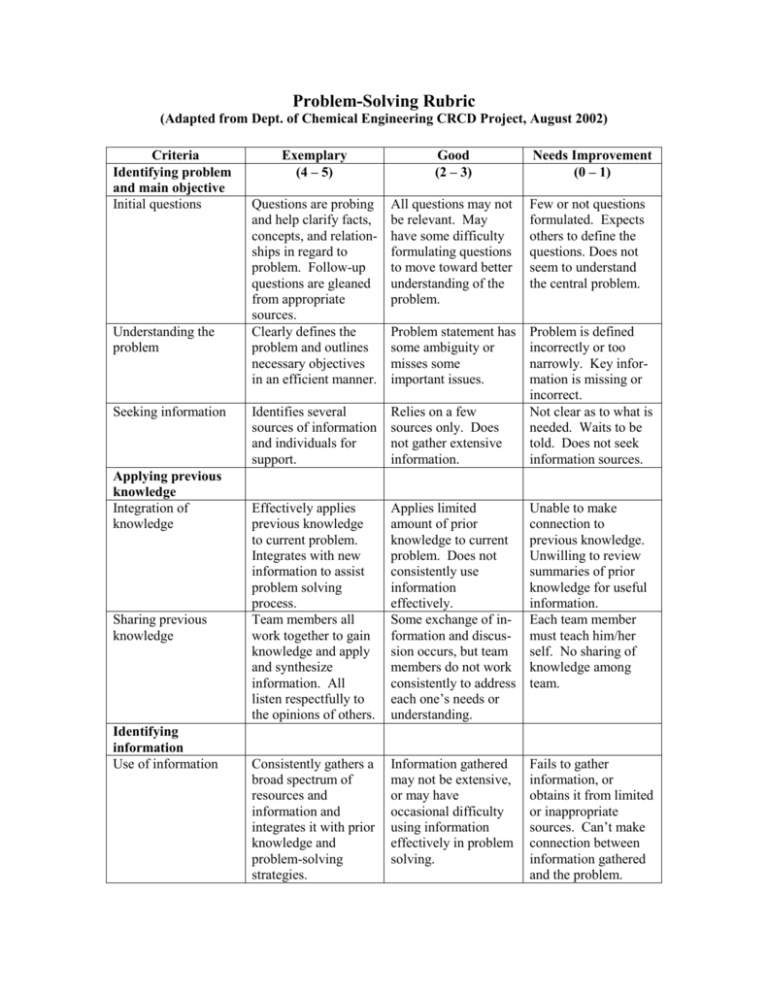
Problem-Solving Rubric (Adapted from Dept. of Chemical Engineering CRCD Project, August 2002) Criteria Identifying problem and main objective Initial questions Understanding the problem Seeking information Applying previous knowledge Integration of knowledge Sharing previous knowledge Identifying information Use of information Exemplary (4 – 5) Good (2 – 3) Needs Improvement (0 – 1) Questions are probing and help clarify facts, concepts, and relationships in regard to problem. Follow-up questions are gleaned from appropriate sources. Clearly defines the problem and outlines necessary objectives in an efficient manner. All questions may not be relevant. May have some difficulty formulating questions to move toward better understanding of the problem. Few or not questions formulated. Expects others to define the questions. Does not seem to understand the central problem. Problem statement has some ambiguity or misses some important issues. Identifies several sources of information and individuals for support. Relies on a few sources only. Does not gather extensive information. Problem is defined incorrectly or too narrowly. Key information is missing or incorrect. Not clear as to what is needed. Waits to be told. Does not seek information sources. Effectively applies previous knowledge to current problem. Integrates with new information to assist problem solving process. Team members all work together to gain knowledge and apply and synthesize information. All listen respectfully to the opinions of others. Applies limited amount of prior knowledge to current problem. Does not consistently use information effectively. Some exchange of information and discussion occurs, but team members do not work consistently to address each one’s needs or understanding. Unable to make connection to previous knowledge. Unwilling to review summaries of prior knowledge for useful information. Each team member must teach him/her self. No sharing of knowledge among team. Consistently gathers a broad spectrum of resources and information and integrates it with prior knowledge and problem-solving strategies. Information gathered may not be extensive, or may have occasional difficulty using information effectively in problem solving. Fails to gather information, or obtains it from limited or inappropriate sources. Can’t make connection between information gathered and the problem. Criteria Framework Tasks Designing and conducting experiments Design Use of evidence Documentation Analyzing and interpreting results Use of analytic tools Exemplary Creates and applies a framework (e.g. diagram, written description) throughout the process. Revises it as necessary. Team takes the initiative to define tasks, match assignments to expertise, rotate responsibilities, maintain open communication, and develop strategies to enhance group success. Good Can create a framework but may not use it consistently in an effective manner, or revise it as needed. Each team member can describe planned experiments and how they relate to the problem; relate hypotheses to previous knowledge; identify necessary steps and timeline for project. Continuously uses results to refine plan. Draws correct conclusions from results. Generates appropriate visual aids that facilitate understanding of the problem. Explores new ways to approach problem. Comprehensive collection of raw and summarized data. Includes detailed information to allow repetition of experiments based only on written notes. Description of planned experiments, relation of hypotheses, identification of steps and timeline, can be accomplished by joint effort of the whole team but not by each team member. Usually adjusts experimental plan on basis of new knowledge. Usually plots/tabulates results to aid in reaching conclusions. Fails to formulate hypotheses to test. Does not express possible outcomes. Data are summarized and organized, but may lack some details or some explanation necessary for repetition of experiments. Laboratory notes aren’t organized. Experimental results cannot be easily found. Experiments cannot be repeated because of lack of information. Consistently uses new procedures and tools Uses new methods and tools, but may not Errors made in analytical methods, All team members generally cooperate and prioritize tasks, but may not consistently rotate responsibilities or work out most effective strategies for success. Needs Improvement Creates a vague framework that doesn’t move the problem-solving process along. Doesn’t seek help from others. Team spends time on tasks that interfere with the problemsolving process. Team members don’t know who is responsible for which task. Data obtained are inadequate or incorrectly calculated. Tables and graphs are not prepared or are difficult to read and interpret. Conclusions are incorrect or not based on evidence. Interpretation of data Analyzing alternative interpretations and solutions Assessing self and others Problem solving process Collaborative learning Overall assessment successfully, and can describe rationale for them. Runs appropriate control and replicate experiments. Able to describe results and conclusions clearly and concisely. Relates results to hypothesis and to currently accepted theory. Can account for unexplained results. Recognizes limitations of current hypothesis and proposes alternative interpretations. always be successful. May not accurately explain rationale. Control and replicate experiments run. Draws correct conclusions from results, but may not relate them well to original hypothesis or current theory. Recognizes results that don’t fit hypothesis but may not readily come up with alternative interpretations. but sources of error aren’t found. Appropriate control or replicate experiments not run. States conclusions without justification. Does not consider internal consistency of results. Cannot compare control or replicate results. Does not recognize that results do not conform to original hypothesis. Cannot suggest alternative interpretation. Critically reflects on problem-solving techniques, strategies, and results. Identifies those most helpful to self. Offers clear insights regarding self-knowledge. Group develops strategies for success, and demonstrates understanding of how problem solving process relates to other activities. Creates a positive environment for reflection on the learning process. Clearly and concisely articulates the problem-solving process and describes how well it was applied to the current problem. Can identify problemsolving techniques that are most helpful, but may not be able to clearly summarize self-knowledge. Unable to reveal insights about own learning. Cannot discuss relevance of problem-solving techniques. Group can assess the contributions of members’ skills, knowledge, and attitudes to the success of the team, but may not develop an overall strategy for success or overview of problem solving. Can describe the problem-solving process, but may not critically assess how well it was applied to the current problem. Assessments of group performance are not insightful. No commitment to group skill development for the future is shown. Little or no attention paid to group morale. Shows little or no understanding of the problem solving process, and cannot assess how well it was applied to the current problem.


